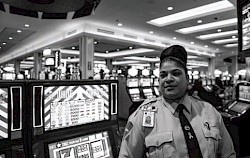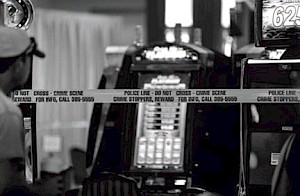
Rules, Regulations and Masks, Oh My
The barrage of mandates by state governors and other officials has had a tiring effect on gaming operations in all jurisdictions. The on-again/off-again mask rules that are virtually different in every state made it difficult for those casinos that required masks and social distancing to expect the public to know which rules applied when they traveled to their favorite casino.
The rise and fall of the “mask police” has created many issues for the casino executive, too. Customers who by strong conviction will not wear masks were sometimes arrested for trespass by security after the simple request was escalated to an eviction and they refused to leave. Managing slot areas with every other slot machine turned off and plexiglass shields on the gaming tables also proved challenging. The ever-popular buffets that had to close or seriously modify the serving of food also became a headache. But the customers still continued to come.
Some states like Nevada formally created gaming regulations to comply with the orders from the governor on masks and other measures. After a series of large fines were levied against gaming properties in both northern and southern Nevada, all casinos were forced to enforce mandates, causing more challenging confrontations from defiant customers.
Labor Market Challenges
There has never been a large labor pool for security officers, and most security directors will tell you that even though they have approved staffing levels, they historically have rarely filled those levels with competent staff. In my work as a consultant, I found that a typical average of 10 percent-15 percent security staff shortage was normal for security departments BC. Attracting qualified and competent security officers has always been a challenge for most gaming properties.
Wages for security officers were always dependent on the jurisdiction, and market conditions and labor expense were fairly predictable from a budgeting standpoint BC. Now the wage range has expanded and, in some instances, surpassed previous levels significantly. Another security consultant in Australia advised me that some casinos were advertising $90 per hour for the holiday period to attract qualified people just for the Christmas and New Year’s period to supplement their already short-staffed operations.
Fast forward to the start of 2022. Labor market conditions have dramatically changed, and some casinos report as high as 50 percent staff shortages in security with very few applicants regardless of wages and benefits offered. There are many different theories for this shortage in personnel—which although interesting, do not help solve the issue or the lack of people to hire in security.
Attempts at resolving staff shortages have mixed reviews and always associated costs. The constant is that labor costs have risen dramatically regardless. Some properties started offering signing bonuses with conditions to attempt to keep new employees for extended periods while others relied on the age-old solutions such as job fairs to draw security employees with little results.
Overtime costs have also risen significantly as a result of staff shortages. Security employee burnout as a result of working additional daily overtime has also been observed at some properties, and should be monitored and tempered when appropriate.
Regardless, with less security personnel working and patrolling the properties, there is less security presence and security footprint in gaming properties than was traditionally in place BC. This has created a need to re-evaluate what functions security personnel routinely do and prioritize those functions.
Eliminating Non-Security Functions
Many properties have taken a fresh look at what functions are performed by security officers to narrow down their minute-by-minute activity. Although this approach merely transfers duties to other departments and does not improve the overall labor challenges, it does provide a higher level of security presence, which ultimately helps reduce the risks of criminal events occurring and impacting the patrons, and future potential litigation as a result.
Most of my work involves legal work as it relates to lawsuits, and my specialty area is casinos and nightclubs. I have never seen the number of lawsuits against casinos as what is occurring currently in courts across the U.S. Notwithstanding that there is a lag time from when an incident occurs until it churns its way through the legal system, there is a noticeable increase in litigation being filed and served shortly after an incident occurs rather than the traditional period just before the statutory time frame of two to five years expires.
The important thing for future litigation is to document what changes and processes you have implemented that will demonstrate your company’s commitment to safety and security for your guests and employees. This includes what changes to the security functions you made, especially those items that are not directly related to a traditional security function.
Non-security functions I have seen range from performing valet-type functions such as limousine services all the way to delivering certain items of value to hotel guests. Although important operationally—and using security promotes a certain amount of trust—it will certainly become an issue at trial if someone was hurt as a result of a robbery or other crime and one or more security officers were performing non-security tasks and not patrolling the property.

Supply Chain Issues
The current supply chain issues in actually receiving the common items used in security and surveillance has also created operational challenges for executives. What was previously quite simple to purchase and receive on loading docks has now become very difficult to actually get. Sales representatives are pushing their products and not truly disclosing the potential time frame from purchase order to delivery, further causing grief for the typical security director and further complicating operations.
What was once a simple purchase of a video camera that covered an important area for surveillance now sometimes has a 12-18-month delivery date delay because of a simple small electronic chip that has become very hard to get. The cost for these goods has also risen, which also has to be considered operationally, especially if that camera is a mandate by regulation or code.
Some directors have told me that what was once discarded as it relates to equipment is now put into a room or vault for possible internal repair or to cannibalize parts to repair others. Finding a technician that has the ability to repair electronics is also quite difficult in today’s environment.
Other routine consumables are not immune to supply chain delays either. Uniforms and related supplies have become harder to obtain and the costs for those goods have also increased as a result.
Increases in Crime
Even the dynamics and characteristics of perpetrators of crimes against casino patrons and employees has shifted. Considering that even criminals have gotten creative to increase their illegal income by victimizing casino patrons, that also creates challenges for the security patrolling to provide a reasonably secure place for people to enjoy gaming and all of its amenities.
Home burglary decreased in 2020 primarily because many people were not working and not leaving their homes, and as a result, the opportunity for the criminal was reduced. As people began to attempt to leave home and venture out, the burglary and property crime came back up. Properties that experience the presence of homeless people near their property also have been impacted with increases in panhandling, TITO thefts and other nuisance-type crimes, which again creates more work for the security personnel charged with herding them away like cats from legitimate customers.
As an example, there has been an uptick nationally very recently in what the press calls “follow-home robberies” of patrons who are observed by a criminal inside of a casino with cash who follows them all the way home and then robs them, sometimes with a gun and seriously injuring them. Pennsylvania appears to have a higher rate of those incidents recently than most states historically.
Even in current economic conditions, gun sales continue to dramatically increase month after month in the U.S., and the sheer availability of guns translates to a future of more gun-related incidents including at gaming properties.
Although many gaming properties have more armed security than a decade ago, the vast majority of gaming properties still do not have armed security personnel. The specialized security squads and response teams of armed security personnel that the larger corporate gaming companies have created and had the ability to deploy have proven beneficial in response to major criminal events, but have minimal deterrence value.
In Nevada where there is a large gaming presence, the murder rate rose by more than 27 percent from 2019 to 2020, according to the FBI. The numbers so far for 2021 appear to increase even more nationally, which is a disturbing trend. Washington state with many rural casinos also saw an increase in homicides by 46 percent in 2020.
Some of those homicides occurred on casino properties or as a result of a victim’s activities at a casino. Aggravated assaults also rose, yet property and other crimes significantly decreased year to year. Violent crimes include homicide, robbery, sexual assault and aggravated assault, and if they occur at a gaming property, they are typically followed by a lawsuit alleging inadequate security or a failure to respond in some manner.
Suggestions Going Forward
The impacts of less security personnel and increased criminal incidents at casino properties will surely create fertile ground for plaintiff lawyers. The higher turnover of personnel will create challenges for defense attorneys in locating important witnesses years from now when lawsuits finally get to trial, or when it is more prudent to settle.
- Continue to assess and evaluate the security functions and narrow the tasks they perform to those that offer the most protection and oversight of the customers.
- Document quarterly in a department report the difficulties in finding personnel and providing them equipment and training to create evidence that the property did what was reasonable to provide safety and security under difficult circumstances.
- Track and monitor the crimes that occur on your property all the way through the prosecution of perpetrators and chart the results. Be diligent in analyzing the crimes that do occur on your property or as a result of a patron’s activities on your property and track by day of week, time, location and circumstances, and design countermeasures to deter, reduce or eliminate the opportunity for criminals.
- Continue creative solutions to supply chain issues that pose operational challenges and use more out-of-the-box thinking.
Keep doing what the gaming industry does best, adapt to the existing conditions. We know that the customers will continue to come regardless of the Covid conditions as long as regulations allow it.
Source: Global Gaming Business Magazine
Date: 01/25/2022
Use this link to access the main article.